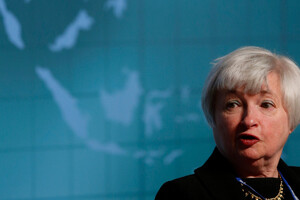Secondary sanctions and other ways to limit Russia's oil revenues were discussed at a meeting in Germany.

Ministers of Finance and Governors of Central Banks countries G7 failed to agree on a single strategy to reduce Russian oil imports, said US Treasury Secretary Janet Ellen, according to Interfax-Ukraine.
According to her, the meeting of G7 finance ministers in Germany discussed secondary sanctions and other ways to limit Russia's oil revenues while minimizing the impact on energy prices.
She added that the goal is to keep some revenues. Russian oil on the market so as not to raise world prices. To do this, it would be possible to create a “cartel of buyers” of Russian oil, which would determine the maximum price to be paid in order to limit Russia's income.
but it's really difficult to make it work, and all these issues have not been addressed, “said Ellen.
It is reported that US President Joe Biden will make oil price restrictions the main topic of his trip to Asia, as Washington and its allies are working to limit one of Russia's main sources of income during its war against Ukraine.
According to media reports, EU leaders also plan to support price caps at a meeting in Brussels in late May to discuss Russia's war against Ukraine.
“Europeans are trying to figure out what they intend to do, and it's mostly up to them. Their key goal is to get rid of dependence on Russian oil over the next year, and I think they are ready to consider ways to reduce Russia's income, “Ellen added.
on how to ensure that part of Russia's oil enters the market to curb global fuel prices.
According to Bloomberg, “price restrictions are still far from being a reality, but are part of efforts to put pressure on Russia without imposing sanctions on Russian energy buyers.”
Read also: Along with the Russian oil embargo is important to stop its transportation by ships flying EU flags – Office of the President
Earlier it was reported that some European Union countries are ready to postpone the oil embargo on Russia indefinitely due to the principled position of Hungary, which refuses to support sanctions against the aggressor state. The EU believes that this will speed up the implementation of the sixth sanctions package, at least to a limited extent. Will a clause on a full embargo on Russian gas be approved in the next Western sanctions package? Why has Europe become dependent on Russia? About this and other things in the article by Mikhail Gonchar “Europe in Russia's energy trap: how to overcome dependence?” .




